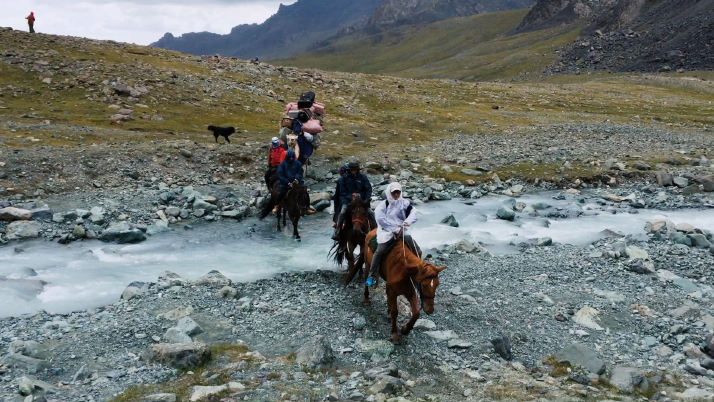| Lifestyle |
| Journey to the West | |
| A documentary aims to increase understanding of Xinjiang | |
|
|
 A promotional poster for the documentary I Am Going to Xinjiang (COURTESY PHOTO)
I'm Going to Xinjiang, an eight-episode documentary following the lives of 24 people, Chinese and foreign, who have moved to northwest China's Xinjiang Uygur Autonomous Region to live and work, aired concurrently on China Central Television (CCTV) and video streaming websites V.qq.com and Bilibili in May. I'm Going to Xinjiang is the follow-up to a previous documentary by Kurbanjan Samat, a young Uygur photographer and director.  Zhou Lina teaches a class in July 2017 (COURTESY PHOTO)
Putting down roots Zhou Lina, the head of a kindergarten in a town near Atushi, a city in southwest Xinjiang, was chosen as one of the central characters in the show. In 1994 Zhou met her husband, a kebab vendor from Xinjiang, in her hometown of Shenyang in northeast China's Liaoning Province. She soon fell in love and they got married against her parents' will. Zhou later moved to her husband's home village in Atushi. In the years since she has learned how to do farm work and cook local dishes, becoming accustomed to indigenous customs and culture. In 2006 she became a Chinese language teacher at a local primary school. "I came to Xinjiang because of love but I also unexpectedly realized my childhood dream of being a teacher," Zhou said in the documentary. "The love of my husband, children, and colleagues has empowered me to stay here," she added. The documentary's 24 protagonists come from all walks of life and include luminaries such as architect Wang Xiaodong, who is a member of the Chinese Academy of Engineering. Seventy-nine-year-old Wang has dedicated his life to preserving the historical residential buildings of Kashgar in Xinjiang's far west. As an idealistic young man, Wang chose to work in Xinjiang after graduating from university in 1963, having been enthralled by the vast and mysterious region since childhood. "Kashgar has been hit by several large earthquakes over the past 100 years. It is the responsibility of an architect to protect historical and cultural cities," Wang said. Through the efforts of Wang and his colleagues, the residential buildings of Kashgar have been transformed into strong, earthquake-resistant structures which retain the outward appearance of the original buildings. "Many people ask me whether I regret having devoted most of my time to the preservation of an historic city rather than designing large and famous buildings. I tell them no because my job is more meaningful than building skyscrapers as it concerns the lives of tens of thousands of people," said Wang. In the 1970s some of Wang's colleagues returned to school to continue their studies, but when Wang's university offered him the opportunity to go back, he refused. "Having lived in Xinjiang for so many years, I have fallen in love with this place, and gotten used to life here. I like Urumqi, capital of Xinjiang, a lot: not too hot in summer, nor too cold in winter, with just enough sunshine," he said.  The production team traverses Bogda Peak in the Tianshan Mountain range in Xinjiang during work on the documentary in August 2017 (COURTESY PHOTO)
Better understanding "Normally when people come to Xinjiang, they don't consider what they can do for the region but whether they can realize their potential and dreams there," said Kurbanjan Samat, the show's director. "However, in the process, many people have managed to do just that as well as creating value for Xinjiang. This is the message I want to deliver most through the film." Born in Hotan, a city in the south of Xinjiang, in 1982, Kurbanjan Samat studied photography at the Communication University of China in 2006 and worked for the CCTV documentary channel after graduation. Upon discovering that many people's understanding of Xinjiang was limited to a simplistic impression of an exotic land where people like to sing and dance, he assumed the responsibility of presenting the real Xinjiang to outsiders. "For many Chinese, Xinjiang remains a remote and mysterious place. However, I want to help people from outside the region to see beyond this perception," said Kurbanjan Samat. In 2015, Kurbanjan Samat published a book of stories and pictures focusing on over 100 Xinjiang people living and working in other parts of China. I Am From Xinjiang on the Silk Road was translated into nine languages including Russian, English and French and distributed globally, with Kurbanjan Samat producing a six-episode documentary under the same name in 2016. The book and documentary have seemingly achieved their desired effect, with many readers and viewers leaving comments on I Am From Xinjiang on the Silk Road's account on social media app WeChat expressing their willingness to experience the region for themselves. While I'm Going to Xinjiang takes a different angle from the previous documentary, they share the same fundamental purpose: to increase understanding and communication between the people of Xinjiang and those in other parts of China. "The documentary reflects the coexistence of multiple ethnic groups and the common prosperity of different cultures in Xinjiang," said Kurbanjan Samat. "I want to represent the diverse cultures of my hometown to everyone using my skill of cinematography. A cinematographer should not lie because he shoulders the social responsibility of recording the truth through his camera," he added. Kurbanjan Samat's next project is a book and documentary about those born and living in Xinjiang with a focus on local delicacies. He wants to show the ethnic diversity of the region which, in addition to commonly known ethnic groups like the Han, Uygur and Kazak, is home to others such as the Kirgiz and Tajik people. Copyedited by Laurence Coulton Comments to jijing@bjreview.com |
|
||||||||||||||||||||||||||||
|
